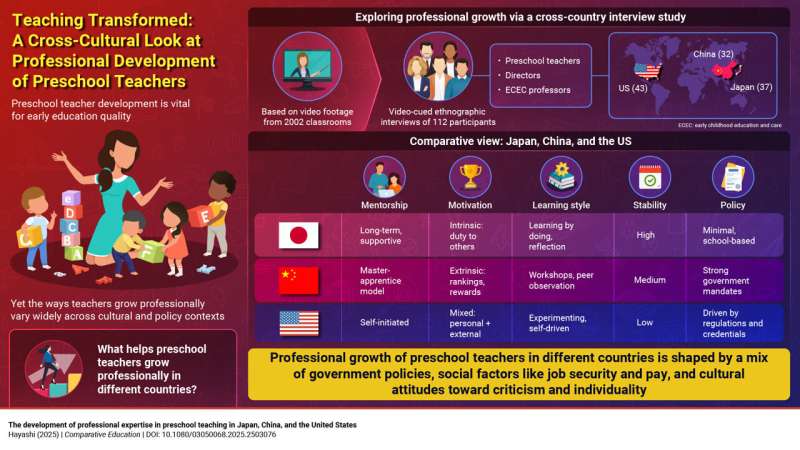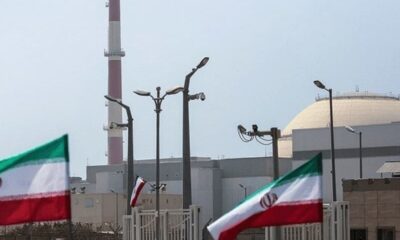Science
Exploring Preschool Teacher Development Across Three Nations

Preschool teachers play a crucial role in shaping children’s early learning experiences, impacting their academic, emotional, and social development. Despite the significance of this profession, the development of preschool teachers often receives inadequate attention compared to other educational levels. A recent study led by Associate Professor Akiko Hayashi from Keio University in Japan sheds light on the professional growth of preschool educators in Japan, China, and the United States. Published online on May 14, 2025, in the journal Comparative Education, this research investigates how cultural, policy, and institutional factors influence teacher development across these three countries.
Dr. Hayashi’s study employs a method called video-cued ethnographic interviewing, allowing for a longitudinal and comparative examination of preschool teacher development. She conducted interviews with six preschool teachers—two from each country—initially in 2002 at the beginning of their careers and again in 2015 after they gained experience. In total, the research encompassed the perspectives of 112 educators: 37 in Japan, 32 in China, and 43 in the United States.
Cultural Influences on Teacher Development
The findings of Dr. Hayashi’s research highlight the distinct ways cultural norms shape professional growth among preschool teachers. In Japan, teacher development focuses on hands-on classroom experience and communal learning. Rather than relying on formal training or workshops, most learning occurs through practical application and reflection. A notable practice in Japanese preschools is ennai kenshū, or in-house study groups, where teachers meet regularly to discuss classroom activities and share insights. This approach fosters professional growth driven by a strong commitment to students and colleagues rather than external rewards.
Conversely, in China, professional development follows a more structured and hierarchical model. Teachers undergo mentoring, evaluation, and are encouraged to adopt proven practices. The environment is characterized by rankings, competitions, and formal assessments, where extrinsic motivation plays a significant role. This system promotes rapid skill acquisition and career advancement, supported by clear pathways and institutional oversight.
In the United States, preschool teacher development tends to be more self-directed. Many American educators express concerns that top-down initiatives aimed at standardizing teaching impede their creativity and autonomy. Instead, they often seek to enhance their teaching through informal methods, such as observing experienced colleagues, experimenting with new techniques, and pursuing additional educational opportunities. While external factors like job security and salary increases are influential, many teachers are primarily motivated by a desire to improve their skills.
Implications for Educational Policy
Dr. Hayashi’s research indicates varied levels of stability in preschool teacher development across these three nations. The collaborative practices in Japan, emphasizing group-based learning, contribute to a more stable environment for teacher growth. In contrast, the individual-focused and extrinsically motivated system in the United States presents challenges to stability. China’s authority-led model strikes a balance, positioning preschool teacher development as moderately stable.
The study underscores that there is no universal model for teacher development; instead, successful strategies must align with the unique cultural values and institutional structures of each country. As Dr. Hayashi concludes, “Beyond its academic value, this study also has practical significance. It can serve as a useful reference in shaping education policy—not only in preschool settings but across the broader educational landscape.”
This research offers vital insights into the professional experiences of preschool teachers and emphasizes the need for greater recognition of their roles in shaping future generations. The findings advocate for a deeper understanding of how cultural contexts influence educational practices and highlight the importance of tailoring teacher development strategies to fit specific environments.
More information on the study can be found in the article titled “The development of professional expertise in preschool teaching in Japan, China, and the United States,” available in Comparative Education.
-

 Entertainment3 months ago
Entertainment3 months agoAnn Ming Reflects on ITV’s ‘I Fought the Law’ Drama
-

 Entertainment4 months ago
Entertainment4 months agoKate Garraway Sells £2 Million Home Amid Financial Struggles
-

 Health3 months ago
Health3 months agoKatie Price Faces New Health Concerns After Cancer Symptoms Resurface
-

 Entertainment3 months ago
Entertainment3 months agoCoronation Street’s Carl Webster Faces Trouble with New Affairs
-

 Entertainment2 months ago
Entertainment2 months agoWhere is Tinder Swindler Simon Leviev? Latest Updates Revealed
-

 Entertainment4 months ago
Entertainment4 months agoMarkiplier Addresses AI Controversy During Livestream Response
-

 Science1 month ago
Science1 month agoBrian Cox Addresses Claims of Alien Probe in 3I/ATLAS Discovery
-

 Entertainment4 months ago
Entertainment4 months agoKim Cattrall Posts Cryptic Message After HBO’s Sequel Cancellation
-

 Entertainment2 months ago
Entertainment2 months agoOlivia Attwood Opens Up About Fallout with Former Best Friend
-

 Entertainment3 months ago
Entertainment3 months agoMasterChef Faces Turmoil as Tom Kerridge Withdraws from Hosting Role
-

 Entertainment4 months ago
Entertainment4 months agoSpeculation Surrounds Home and Away as Cast Departures Mount
-

 World2 months ago
World2 months agoCole Palmer’s Mysterious Message to Kobbie Mainoo Sparks Speculation




















